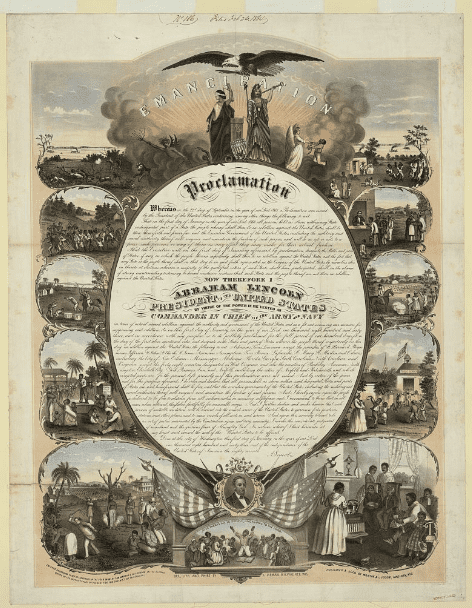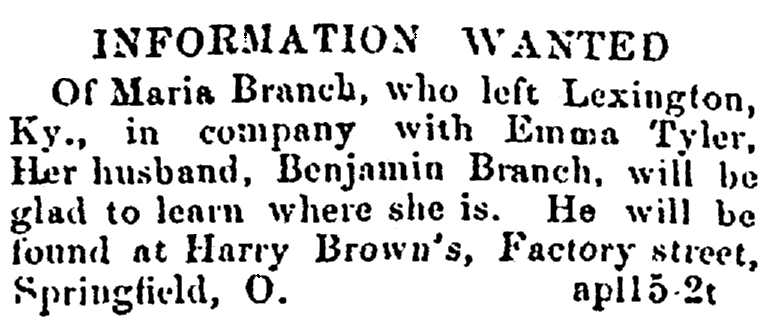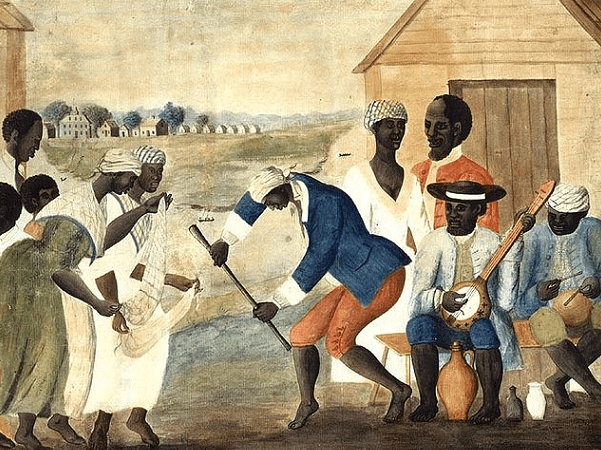Introduction: In this article, Mary Harrell-Sesniak searches “missing person” ads in old newspapers to learn more about how newly-freed Blacks found missing members of their families after the Civil War. Mary is a genealogist, author and editor with a strong technology background.
There is something tragic about the pain of families separated by war – even more so by those hurt by the two-fold tragedies of war and slavery.
After the Civil War and emancipation of the slaves, there was much rejoicing – but how were Black families reunited?

Some had managed to follow the fates of family members, but others were sold and transported to far-away places. Keeping in touch with family members was in some cases virtually impossible.
The Role of Newspapers in Reuniting Black Families after the War
One of my earlier blog articles (Civil War Genealogy: Old Letters in Newspapers & Research Resources) examined how free families during the war communicated with missing members. Newspaper advertisements became the lifeline, and we see the same with the newly freed Black families after the Civil War.
In the example below, Benjamin Branch is hoping someone can tell him the whereabouts of his missing wife Maria.

Although the first African American newspaper appeared in 1827 (see: ‘Freedom’s Journal’: The 1st African American Newspaper Published in America), after the Civil War many more African American newspapers started to emerge. Publications such as the Black Republican of New Orleans, the Colored Tennessean of Nashville, and the Colored Citizen of Cincinnati printed numerous queries asking for information on missing persons.
“Information Wanted” Project
Most of these missing person newspaper ads were published under the headline of “Information Wanted.” Civil War and African American researchers have taken note of this, and are now documenting these communications in a project by the same name. You can read about this project and assist by adding submissions or transcriptions of the advertisements at http://informationwanted.org/
Since GenealogyBank has one of the largest and fastest growing collections of African American digitized newspapers, I’d like to share search tips to help build this powerful family history resource.
Genealogy Tip: These missing person newspaper ads fill in and confirm family history details not easily found elsewhere. It’s possible you may learn:
- Names of family members
- Alternate surnames (see following examples of Mrs. Louisa Stewart and son Joseph Nelson and Mrs. Jane Gates with daughters Pruly and Clora Brenate)
- Family relationships
- Ages and descriptions
- Last whereabouts and residences
- Places of birth
- Plantation owners
- Slave sales
- Occupations
- Civil War Service
Short-lived Publications
Publishing a newspaper is an ambitious undertaking, but making one profitable and sustaining a subscriber base is even more difficult. As a result, newspapers came and went.
Note this example: the Colored Tennessean of Nashville. This short-lived publication of editors W. B. Scott & Son began 29 April 1865 and ceased publication sometime in 1866.
From the first ad below we learn: Henry Hill’s wife has a potential maiden or slave owner’s surname; where she was five years earlier; Hill’s occupation; and the street where he resided at the time of the ad.
Information Wanted
OF MY WIFE, LUCY BLAIR, WHO I LEFT in Jonesboro, Washington county, East Tennessee, five years ago. She was then living with William Blair. I was raised by John Blair. I am a wagonmaker by trade, and would be thankful for any information respecting her whereabouts. I am in Nashville, Tenn., on Gay street, north of the Statehouse. Address me or the Colored Tennessean, Nashville, Tenn., Box 1150. HENRY HILL.
jy29-3m
The second ad, placed by Levy Done, names his mother and brother as Kissy Done and Joseph Done, and mentions an uncle.
Information Wanted.
OF KISSY DONE, WHO LIVED AT Corinth, Miss., in 1862, but I learned she left there in the fall of the same year for Memphis. She is my mother, and I would be glad to hear from her. I have a brother named Joseph Done, and I also have an uncle somewhere in that country. Any information respecting their whereabouts will be thankfully received. Address Colored Tennessean, Nashville, Tenn., Box 1150. LEVY DONE.
Jy29-1m
Genealogy Tip: To learn more about the longevity of a particular resource, see the Library of Congress’ Chronicling America database. For instance, the following link will tell you more about the Colored Tennessean newspaper. http://chroniclingamerica.loc.gov/lccn/sn83025745/
Advertisement Dates
At the bottom of many ads are details of how long the enquirer paid for the ad to be run.
For example, the notation “Jy29-3m” indicates that Henry Hill’s ad commenced on 29 July 1865 and would run for three months. Levy Done’s ad started the same day, but would stop in one month.
Genealogy Tip: If you can’t read a particular ad, look for a subsequent run which may be more legible. This is important, as you will see in some of the following examples that old newsprint often faded.
More Examples of “Information Wanted” Ads
Civil War Service: This first ad was placed by John Milton of the 44th U.S.C. T. According to an article of 4 October 2010 at The Civil War Picket Website (accessed 9 April 2017), this group of Colored Troops was organized at Chattanooga, Tenn., and Rome and Dalton, Georgia. See http://civil-war-picket.blogspot.com for more articles.
Recruitment of colored regiments began in full force following the Emancipation Proclamation of January 1863.
Last Contact: This ad confirms family connections of the David and Lucy Morgan family who formerly lived ten miles from Memphis, Tennessee, and who formerly belonged to William Morgan. It also states that no contact had been made in four years.
Multiple Residences: This ad verifies family in three locations: a birth in Fairfax County, Virginia; a residence on Melpomene Street in New Orleans; and another on a plantation near Columbia, Arkansas.
The pathos inferred in these ads is important reading. The family history information they contain is very helpful for genealogists. Further, I encourage all students of the Civil War to research these important aspects of Americana communications – and to join the task of adding to the Information Wanted project.
Genealogy Tip: Don’t forget to look in multiple publications. When someone was clueless where family had ended up, it’s likely they placed ads in multiple sources.
Related Articles:
